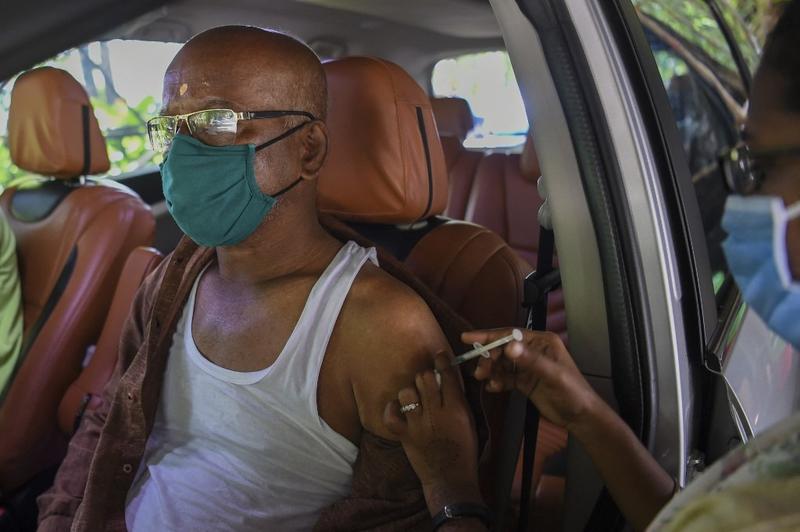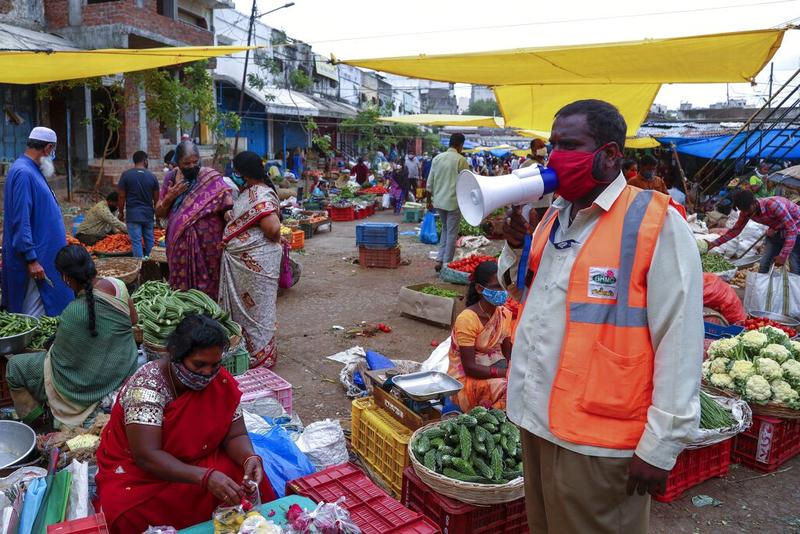 An elderly man gets inoculated with a dose of the Covishield vaccine against the COVID-19 at a drive-in vaccination facility in Mumbai on June 26, 2021.
(PUNIT PARANJPE / AFP)
An elderly man gets inoculated with a dose of the Covishield vaccine against the COVID-19 at a drive-in vaccination facility in Mumbai on June 26, 2021.
(PUNIT PARANJPE / AFP)
The emergence of a more contagious Delta+ variant of COVID-19 virus in some Indian states has triggered another major cause of concern.
On Friday, Indian government said that 51 cases of Delta Plus variant of the coronavirus have been detected across 12 states in the country, with Maharashtra, reporting the highest number of 22. Maharashtra on Friday also reported the first death due to the Delta Plus variant.
Moreover, around 200 cases of the new Delta plus variant with an additional mutation called K417N had been found in as many as 11 countries till June 16.
The Indian government on Tuesday classified Delta Plus, the new mutant version of Delta variant of SARS-CoV-2 coronavirus, as a variant of concern
The union health ministry on Friday asked chief secretaries of eight states to take immediate containment measures in those districts where cases of patients infected with the Delta plus variant of COVID-19 have been found.
The Indian government on Tuesday classified Delta Plus, the new mutant version of Delta variant of SARS-CoV-2 coronavirus, as a variant of concern.
Sujeet Kumar Singh, director, National Centre for Disease Control, said in India, COVID-19 “variants of concerns” were found to be distributed in 174 districts in 35 States. The highest numbers were reported from Maharashtra, Delhi, Punjab, Telangana, West Bengal and Gujarat.
According to the Union health ministry, the Indian SARS-CoV-2 Consortium on Genomics, a network of 28 laboratories, found that the new virus has increased transmissibility, stronger binding to receptors of lung cell and leads to potential reduction in monoclonal antibody response that can fight the disease.
Delta grew to become the dominant variant in India due to its improved ability to jump to new hosts, according to a recent study carried out by a group of scientists from Institute of Genomics and Integrative Biology in collaboration with Cambridge University’s Gupta Lab.
ALSO READ: Delta variant gets foothold
The unique set of mutations makes the virus more infective, leads to higher viral load in people and causes larger outbreak clusters, according to the study.
The Delta variant or B.1.617.2 — first detected in India — carries a number of mutations in the spike protein that have been linked to increased transmission of the virus, according to health experts. The Alpha variant or B.1.1.7 was first identified in the UK.
The World Health Organization suggested three parameters—increased transmissibility, more virulence, and decreased effectiveness of public health measures—to determine its seriousness.
"WHO is tracking this variant as part of the Delta variant, as we are doing for other Variants of Concern with additional mutations," the WHO said.
The new mutant variant may just be capable of dodging immunities, both from COVID-19 vaccines as well as from earlier infections, said virologist Shahid Jameel.
Health experts warned that Delta Plus could strike another wave of coronavirus infections in India. Another group of health experts, however, suggested it is too early to say whether Delta Plus, labelled as a "variant of concern", will be responsible for a third wave of coronavirus, several other factors will be responsible for third wave.
The longer the virus continues to spread, the more variants can emerge, said Amitava Nandi, virologist and infectious disease specialist.
 A Greater Hyderabad Municipal Corporation employee makes announcements during a special vaccination drive against COVID-19 at a vegetable market in Hyderabad, India, Thursday, June 24, 2021. (MAHESH KUMAR A. / AP)
A Greater Hyderabad Municipal Corporation employee makes announcements during a special vaccination drive against COVID-19 at a vegetable market in Hyderabad, India, Thursday, June 24, 2021. (MAHESH KUMAR A. / AP)
Expressing ‘a little bit of concern’ Dr Randeep Guleria, director of All India Institute of Medical Sciences said, “It’s important we be proactive and take steps right now. If we see a surge in cases in any area, we test and see if it is the Delta Plus variant.” And containment strategies should be devised to curb the spread.
The longer the virus continues to spread, the more variants can emerge, said Amitava Nandi, virologist and infectious disease specialist
The spike protein mutations make the Delta variant the “fastest and fittest” variant yet, according to the WHO.
“The disease caused by this variant might also exhibit different symptoms than other viral mutations. Those with the Delta variant often complain of headaches, sore throat, and a runny nose, replacing cough and loss of taste of smell as the most common symptoms,” Nandi said.
With the beginning of gradual unlocking process in various states following the brutal surge in COVID cases in April and May that ripped apart the country, COVID-19 cases are now falling rapidly.
India recorded 51,667 new coronavirus cases and 1,329 deaths in the 24 hours ending 9 am on Friday, down from the daily spike of 400,000 cases in May.
With this, the country’s total caseload has risen to over 3,01,34,445, while the death toll nears the 0.4 million. The active caseload has dropped to around 0.6 million. The drop in numbers has largely been attributed to strict lockdowns by states.
Crowding in markets, election rallies and religious festivals were blamed for the second wave. Bad policy decisions, poor surveillance and ignoring early warnings were some of the other reasons.
Guleria suggested three pronged measures, including appropriate behavior, good surveillance to stamp out the virus from spreading, and vaccination, to protect India from a possible third wave.
Many health experts have suggested that the new outbreak would be better controlled compared with the current one, which has been far more devastating - with shortage of vaccines, medicines, oxygen and hospital beds - than the smaller first surge in infections last year.
“If a third wave comes, people should not suffer,” Arvind Kejriwal, Delhi’s chief minister, said earlier this month.
"It will be more controlled, as cases will be much less because more vaccinations would have been rolled out and there would be some degree of natural immunity from the second-wave," said Dr Guleria said.
Indian cities and states are building oxygen plants and setting up new COVID-19 treatment centers, preparing to prevent the possible third wave.
New Delhi, among the worst-hit places during April and May, has bought 25 oxygen tankers for transport, and building 64 small plants and one large one to produce it. India’s financial center Mumbai has set up more COVID-19 centers, adding 5,500 beds, including some for children, a senior health official from Mumbai said. India’s junior minister of health and family welfare, Ashwini Kumar Choube, tweeted on Friday that 300.79 million vaccine doses has been administered so far under nationwide vaccination drive.
READ MORE: Sydney in two-week lockdown as Delta variant infections rise
The Ministry of External Affairs Thursday said that India’s stand on vaccine exports will depend on its domestic needs and asserted that priority remains to utilize made-in-India jabs for its own inoculation drive.


